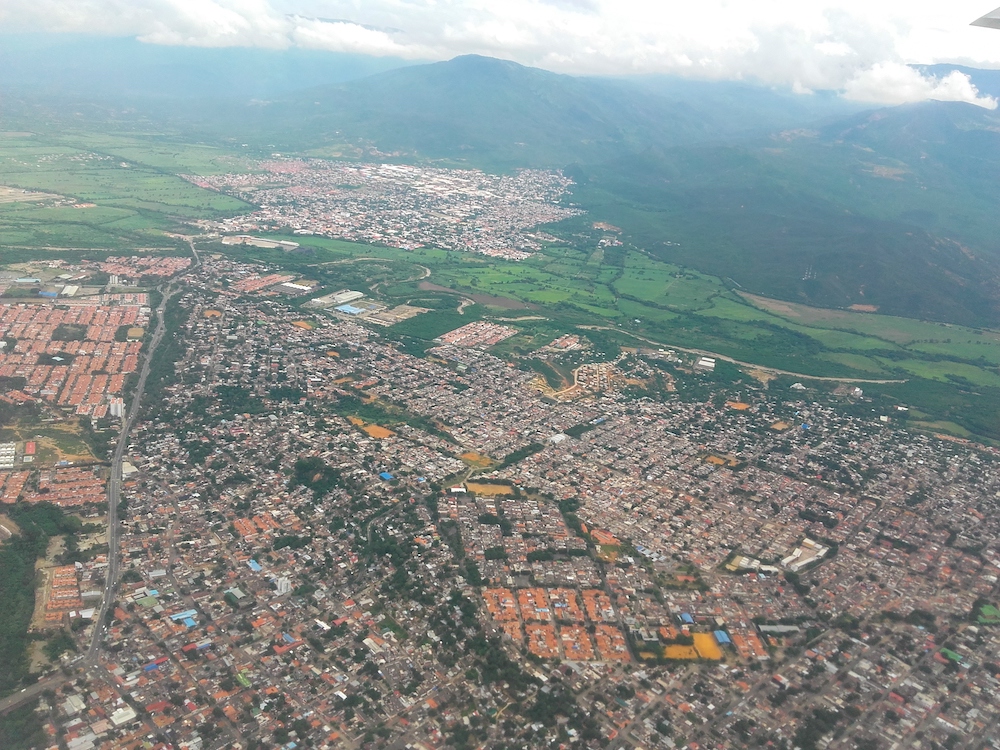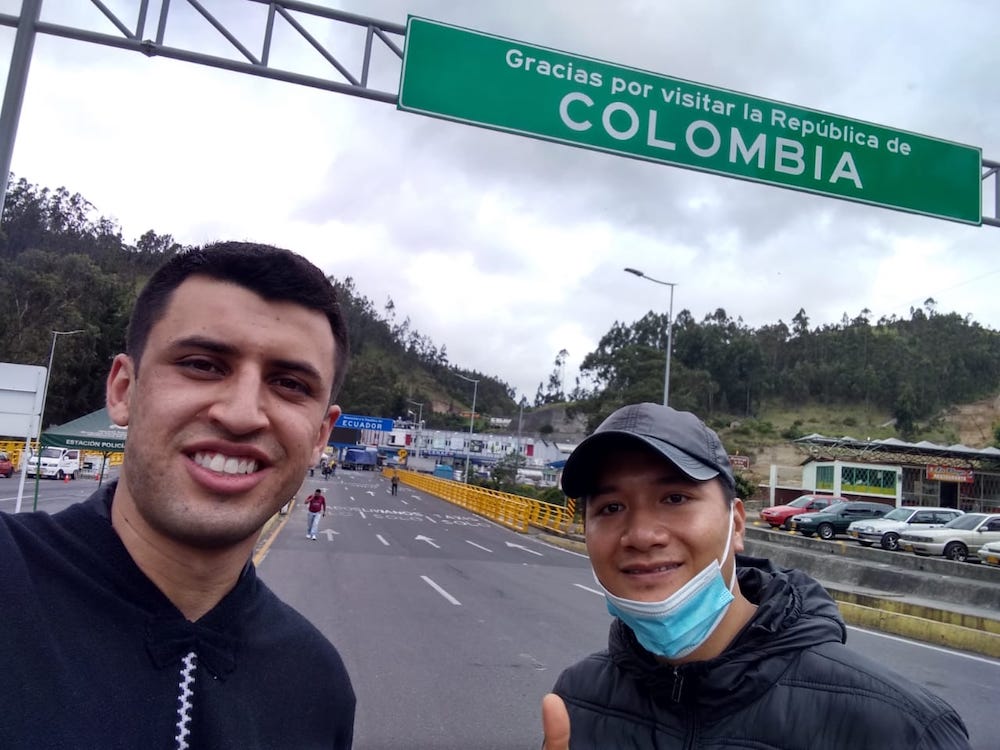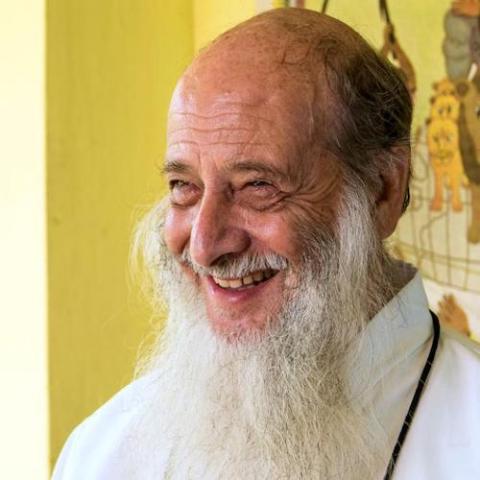Humanitarian worker Angie Rincon speaks with Venezuelan migrants in early October 2020, at the entrance to Pamplona, Colombia. Rincon is leading a project for migrants funded by Caritas France. (CNS/Manuel Rueda)
As some 1.7 million Venezuelans have come to neighboring Colombia to flee their country's economic and political turmoil, Catholic dioceses and aid organizations have struggled to meet their needs.
Although Colombian President Iván Duque announced a plan Feb. 8 to regularize the situation of 1 million undocumented Venezuelans for the next 10 years, Catholic analysts say the terrible reality is that the migrants require more than Duque can offer.
They also point out that the proportion of undocumented Venezuelans in Colombia has grown during the coronavirus pandemic. With the borders between the countries closed, many refugees are entering Colombia through irregular trails known as trochas.
"That's something dangerous, because criminals often monitor them and charge them money for 'security,' " Fr. José Elver Rojas told NCR.
Rojas is based in Cúcuta, Colombia's busiest border city, a gateway for thousands of Venezuelans who are heading to the capital Bogotá and to other South American countries, especially Peru.
Rojas estimates that the number of Venezuelans in Cúcuta is about 250,000. The town's total population is 900,000.
"There's no real control, so we can't know for sure. But the impact on the city's social life is visible," said the priest.

The Colombia-Venezuela border at Cúcuta (Wikimedia Commons/EEIM)
Unemployment in Cúcuta reached 25% at the end of 2020, and informal, unstable work arrangements are dominant in the city's labor market. The pandemic has further intensified the social crisis.
"A person that comes from another country and is not offered any work opportunities becomes vulnerable to illegal groups' proposals," Rojas said, adding that prostitution is also a frequent activity among Venezuelan immigrants in Cúcuta.
"People need to send money to their families back in Venezuela," he said.
The Diocese of Cúcuta has been offering food, medicines and childcare support to thousands of Venezuelans over the last few years with the help of several international organizations, such as the Populorum Progressio Foundation, Adveniat and the U.S. bishops' conference.
Before the pandemic forced their closure, the diocese had operated several immigrant shelters, including near a few trochas. Now, they provide food kits instead of hot meals. In 2020, 1,800 tons of food were distributed by the church in the city.
Ipiales, 900 miles southwest of Cúcuta, is another migrants' hotspot in Colombia. On the border with Ecuador, the city is a necessary crossing point for Venezuelans who want to go to Peru and Chile. With the border closed, people are coming and going through a hundred trochas in the region, said Juan Pablo Navarro, a Mexican-born Scalabrinian missionary and seminarian in Ipiales.
"There's much confusion now," Navarro told NCR. "The other day, a group of young Venezuelans came from Lima, because there's a strict quarantine in the city and they were unable to find work. At the same time, many people are continually crossing the border to get to Peru."

Juan Pablo Navarro, at left, is seen with fellow Scalabrinian missionary Tien Nguyen Van at the Colombia-Ecuador border in Ipales, Colombia. Migrants from Venezuela pass through Colombia to Ecuador on their way to Peru or Chile. (Provided photo)
The Scalabrinians operate a shelter in Ipiales, where they can accommodate 25 people at a time. They also distribute food and medicines to migrants.
"Their health and psychological conditions are very bad," Navarro said of those they help. "Many immigrants have been showing signs of hunger. The children are usually impacted by long hours walking under the sun."
Rojas said that every month at least 30,000 migrants cross into Colombia on foot, coming and going through Ipiales and Cúcuta.
In Bogotá, the concentration of Venezuelans is enormous. The Colombian government estimates that there are 333,000 Venezuelans living in the capital, but Scalabrinian Fr. Flor María Rigoni says their actual number may be as large as 800,000.
"Unfortunately, the government hasn't shown a deep commitment to the poor," said Rigoni. "A few months after the lockdown was decreed last year, the necessary aid ceased to get to the neediest in society."
The Scalabrinians lost even the World Food Program's support and have been financing their own missions. They have a few schools of professional education and are currently building two other big centers.

Scalabrinian Fr. Flor María Rigoni (Provided photo)
"We offer to the Venezuelan immigrants software classes and professional training in other areas," said Rigoni. "While they study, they stay in our shelters."
With the pandemic, the Scalabrinians had to reduce the number of students by half. Most try to find informal jobs in order to get money to leave the shelter, but it is more difficult now.
The growing poverty among immigrants in the city has been generating xenophobic reactions.
"When you don't find the means to feed your children, you're up to anything," said Rigoni. "Now there are many Venezuelans imprisoned. They're becoming the Colombians' scapegoat."
In October, Bogotá mayor Claudia López blamed Venezuelan immigrants for the increasing wave of violence in the city and said that criminals should be immediately deported.
Women and children have been especially vulnerable. Rigoni said you can see in every avenue in Bogotá hundreds of people begging for money.
"Recently, I was told by a Venezuelan mother of two that an unknown man approached her on the street and offered to pay her $7 to take her kids for a day," said the priest. "He planned to use the kids to touch people's hearts and beg for money."
Bogotá's large prostitution district is another major destination for hundreds of Venezuelan women. Young immigrants, including underage women, can be spotted half naked in the area, frequently without a mask.
"The pandemic intensified the operations of human traffickers, who often use the internet to attract their victims," said a Catholic sister who asked not to be named due to the risks posed by the criminals who control such activities.
"They count on the police's leniency," said the sister. "I can't publicly denounce them. They would just kill me."
The sister said some of the young women told her about their desire to stop being prostitutes, but they don't have the means to invest in a business. "We need the government's support in order to integrate those women to the economy," said the sister.
With so many difficulties, many Venezuelans appeal to their faith as their only resource in order to keep strong.
"I have much faith in God, and it helps me a lot," Venezuelan immigrant Delida Veliz told NCR. "Last week we didn't have anything to eat. Suddenly, a man appeared, we started to talk and then he offered to buy us food. We could even drink a Coke."
Veliz left Valencia, a city near Caracas, after her son was shot dead by robbers more than four years ago. Now she lives in Cúcuta with her daughter, two grandchildren and a cousin. They sell coffee, cigarettes and street food in front of their house.
Advertisement
"I try to send money to my family in Venezuela every month, but over the past three months I have failed to do so," said Veliz. "Sometimes we only have food to eat once a day."
Veliz laments that her 21-year-old daughter "has been losing her life" working all day long in the family's makeshift business. "She had her life in Venezuela," Veliz said of her daughter. "She was being trained to be a professional model."
As someone who opposes the political movement inspired by the late authoritarian leader Hugo Chávez, Veliz had to quit her job at the Legislative Assembly in Venezuela's Cojedes state.
In Cúcuta, she used to clean houses and work at the diocesan soup kitchen. Now her income has dropped significantly since the kitchen has closed because of the pandemic. "I pray God to end this pandemic and give us more jobs," said Veliz.
In Ipiales, Vanessa Landaeta had to pause her journey to Lima and stay at the Scalabrinians' shelter after her husband started to feel a strong pain in his stomach. "He had peritonitis and underwent surgery," she told NCR. They're traveling with his mother and their three children.
"The worst part of it all is to walk and walk so much and to sleep on the street," said Landaeta. "Sometimes we're ill-treated because we're foreigners. But that's not the case here [with the Scalabrinians]."
Because of Duque's Feb. 8 announcement, people like Veliz and Landaeta will now be able to obtain Colombian documents and will have access to the country's healthcare system.
Veliz said she expected the result to be positive. The Colombian bishops have also praised Duque's plan, calling it a "valuable response" towards "welcoming, protecting, promoting and integrating" migrants into Colombian society.
Venezuelan migrant Luisiana Cordoba organizes her belongings as she takes a break in Gachancipa, Colombia, June 28, 2020. Cordoba had been on the road for a week and was trying to make her way to Venezuela with her three children, after losing her job in Ecuador. (CNS/Manuel Rueda)
But Fr. Ignacio Madera Vargas, a theologian at the Pontifical Xavierian University of Bogotá, argued that the magnitude of the economic and social crisis makes Duque's plan seem more like a political stunt.
"The Colombian state doesn't have what is needed to welcome those people," said Madera. "Duque hasn't created a policy to integrate them into the economy."
Madera portrayed Duque's plan as only a strategy to confront Venezuelan President Nicolás Maduro, who Duque notoriously opposes. The theologian also noted that the plan doesn't include measures to protect Venezuelan migrants from exploitation by Colombian companies.
"The immigrants work in terrible conditions, particularly in small businesses," said Madera. "This will certainly continue to happen, given that the country's profound inequalities are here to stay."
"The banks' profits haven't been impacted by the pandemic," he said.







